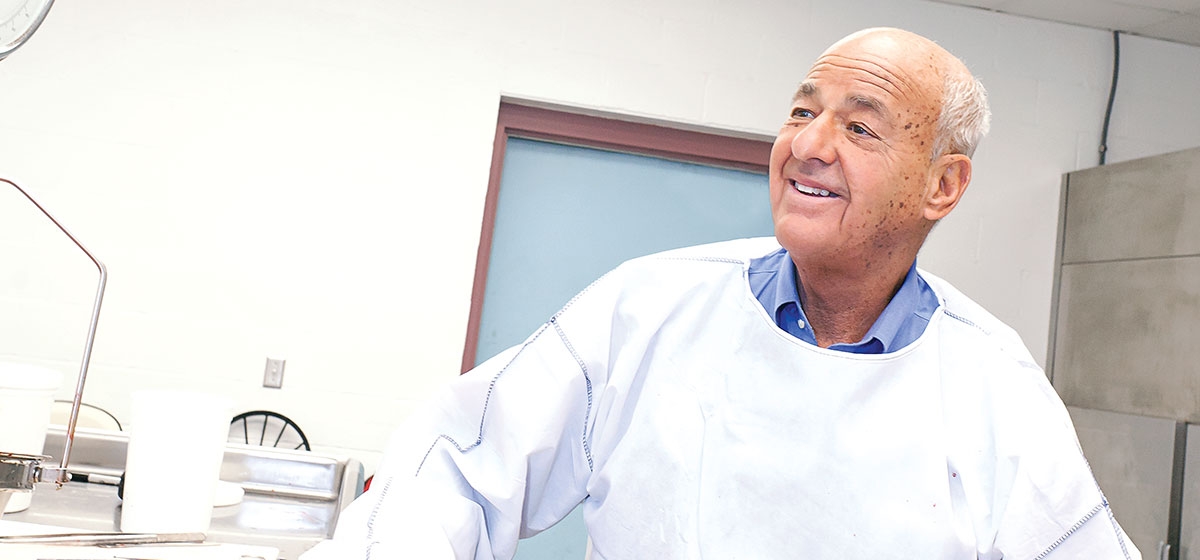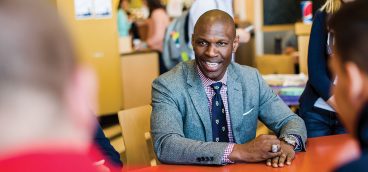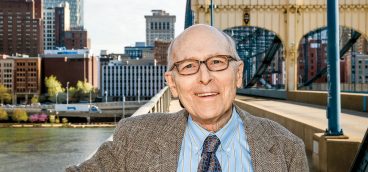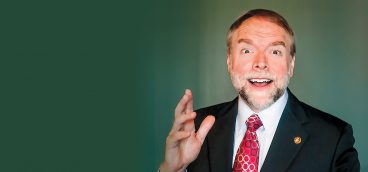Cyril H. Wecht, M.D., J.D.

Editor’s Note: On the occasion of the passing of the brilliant and controversial forensic pathologist, Dr. Cyril Wecht, we thought you would enjoy reading the story of his life in his own words. There will never be another like him.
My mother and father were immigrants who had a mom-and-pop grocery store, and they worked hard. I was an only child—born March 20, 1931—and, from the beginning, my father told me that I was going to be a doctor.
I was an obedient child, so I never questioned it. Then as I moved through high school and into college, my life just seemed to flow that way. It was inculcated into me and that was it.
I went to Pitt—pre-med, of course—and was very active. I was president of the student body and of my fraternity. I was business manager of The Pitt News and of the Pitt Players. I had the lead role in “Our Town” and was concertmaster of the orchestra. I was even president of the YMCA—as a Jew! Back then, if you were a Big Man On Campus, everybody assumed you were pre-law because all BMOCs were pre-law. People kept asking, “Where are you going to go to law school?” Maybe that’s what gave me the idea of becoming a lawyer as well as a doctor.
Even before I finished my medical studies, I knew that I didn’t want to be a general practitioner. As you might guess, I was looking for something more exciting. I had already decided to go to law school and was looking for a field of medicine that was integrated with legal applications. That’s when I found forensic pathology. And even though I had been accepted to both Harvard and Yale, I chose the Pitt School of Law because I was also accepted into the pathology residency program at the Veterans Administration Hospital here in Oakland. They would let me go to law school during my residency, as long as I fulfilled all of my obligations at the hospital.
So for two years, I was a full-time law student and a full-time resident of pathology. But I needed one more year to finish up my law degree. Unfortunately, I got deferred through the military under what was called the Berry Plan. The idea was to let students finish med school and complete their residencies and specialties, then grab them for military service once they were full-fledged thoracic surgeons, etc. It sure beat grabbing a bunch of general practitioners! So they grabbed me as a pathologist. Law school was of no real concern to them—but I caught a break.
As luck would have it, I was stationed at the largest Air Force hospital in the country—400 beds and specialists in all fields—which was also the Air Force’s pathology center! And boy, did we have a huge load. A couple of dozen bases throughout the Southeast regularly sent us their specimens for analysis. Long story short, I got credit for third- and fourth-year pathology training while doing my military duty. All I needed was one more year of law school and a fellowship in forensic pathology. That’s when I discovered an excellent forensic pathology program at the medical examiner’s office in Baltimore and the University of Maryland, which had a good law school with a fully accredited evening division. So I went there, finished my third year of law school in the evening, and did my fellowship in forensic pathology at the M.E.’s office, then returned to Pittsburgh in the summer of 1962.
In my field, the term “legal medicine” is the over-arching rubric under which fall the disciplines of forensic pathology, hospital law, and healthcare and medical ethics. In forensic pathology, one deals with homicides and suicides, civil litigation and so on, and that kind of work made sense for me. I could use both my medical and legal backgrounds to the fullest extent. But I wasn’t planning on becoming a big shot. What evolved thereafter, I had nothing to do with directly.
In the fall of 1963, one of the program chairs for the upcoming 1964 annual meeting of the American Academy of Forensic Sciences called and told me that they were going to do a full-day program on the Warren Commission Report. It would be considered from the perspectives of pathology, toxicology, psychiatry, criminalistics, anthropology, etc. He then asked if I would be willing to address the John F. Kennedy assassination case from the pathology angle. I said, “Sure.” So I went to the Carnegie Library in the fall of 1964 to review the report. It comprised 26 volumes and—to my horror—had no index! The bastards did this deliberately, of course, so that the American public wouldn’t bother reading it. Eventually, I found what I needed and gave my presentation in February of 1965, and I’ve been up to my eyeballs with J.F.K. in every way ever since. Things just sort of snowballed from there.
In 1968, Tom Noguchi, who was one of my good friends and colleagues, was the chief medical examiner of Los Angeles. One day, I got a call at 3 or 4 in the morning from Tom to tell me that Robert Kennedy had been shot. Now, Tom didn’t need any advice on the autopsy. But he knew of my involvement by that time with J.F.K., and was concerned that the feds would try to pull the same thing that they did with John—remove the body. I recommended that he speak with Pierre Salinger, a native Californian who was close to the Kennedys, and that he get the jump on the feds by inviting three military forensic pathologists to attend the autopsy. He did that and, for some reason, I ended up on national television with Dan Rather. Before long, all sorts of people started calling me about cases such as those of Sharon Tate, Patty Hearst, Elvis Presley and Tammy Wynette. So I’ve met many interesting people through the years. Famed attorney F. Lee Bailey, for example, recommended me to the D.A. of Suffolk County for the Mary Jo Kopechne case, and I testified before the judge as to why her body should be exhumed.
You know, I’ve probably done more exhumations than any other forensic scientist in the country because my work has been so involved in medical-legal matters. In fact, I just did an exhumation for a guy who’d been dead for two or three years. And even I, after 45 years and more than 100 exhumation autopsies, for a moment thought, “What the hell is this?” My nose is yours and my eyes are yours. I can smell and see what you smell and see. But there are certain things to which you can’t acclimatize. You can’t be trained not to smell or see. But it’s the work that I do. For me, the most important thing is never to lose cognizance of the fact that I’m dealing with deceased human beings. Somebody somewhere loved these people. These situations must always be handled with great dignity and respect. This is not to raise a flag, but those of us in forensic pathology, we recognize that what we do is very, very sensitive—and also very, very important.
Sometimes comments come back, often snide, about my involvement in certain high-profile cases. Well, that’s what I do as a forensic pathologist. My work with the media hasn’t kept me from doing autopsies. There aren’t very many pathologists around who have done more than me, and there aren’t very many who, at my age, are still doing them—more than 300 a year. So my detractors can take their criticism and shove it. The point is, the more involved you get in very big cases, every time you testify, your expertise (or, for some people, the lack thereof) is on record. In the old days, people had to seek out “Attorney X” in Connecticut or “Attorney Y” in Kansas to get a record of who said what in a particular case. Today, you can just push a couple of buttons and everything you ever said is there for all to read or hear. Now more than ever, we must maintain our honesty, integrity and credibility, otherwise our careers will be finished.
So does it make me an egomaniac to say that I enjoy the media and being on TV programs? I don’t think so. I don’t rush home to see myself. I don’t get “Investigation Discovery” on cable. One of my sons, who lives just two blocks away, does, but I don’t go over there to see myself. In fact, the producers send me disks of the shows and I don’t look at them. I simply don’t have the time, and I watch very little TV anyway. I read five newspapers every day—four on Saturday when there’s no USA Today, and three on Sunday. (There’s no Wall Street Journal on that day either.) I still work seven days a week, many evenings, and I like to write. I don’t waste time. I give interviews, even while I’m in the car, via cell phone. I get many requests from students and I’ll often have them call me at home on weekends when I’ll have more time to spend with them.
Sure, I work hard. And yes, I’m proud of what I do. They named the Allegheny County medical examiner facility after me, you know. And I’ve won more awards than I can count. So don’t feel sorry for me because of my schedule. My wife and I, we get away when we can—three-day weekends, if they fit with the various programs that I keep up with. For the most part, things quiet down in the courts during the holidays, so we like to get away for Christmas and New Year’s. We love movies and have season tickets to many things here in town, including the Steelers. Most, of course, are shared with my family.
It’s amazing, but all of my kids wound up in Pittsburgh—without any scheming or conniving on my part. My oldest son, David, went to Yale and is now administrative judge of the Family Division with 13 judges under him. He’s going to be running for Superior Court next year in Pennsylvania. He’s got four kids. My second son, Daniel, went to Harvard, did medical school at Penn, then six years of training in neurosurgery followed by a two-year fellowship at Yale. He’s a neurosurgeon at UPMC and has three kids. My son Ben graduated from Penn, has a master’s degree from Stanford, and is program director of the Cyril H. Wecht Institute of Forensic Science and Law at Duquesne. He’s got two kids. My daughter, Ingrid—my youngest—went to Dartmouth and then got her master’s and medical degrees at Georgetown. She’s an OB/GYN specialist, grouped mostly with West Penn, and she has two girls. So we have four kids, their spouses, and 11 grandchildren, and we get together at our home almost every Sunday when we’re in town, and share dinner or brunch once in a while. One shouldn’t take family for granted.
Yes, there were times in the past when I could have packed up and left Pittsburgh. I could have been the chief medical examiner of Nassau County, N.Y., for example. I once had an offer to become a professor of legal medicine at the University of Texas. And who knows? I also might have become the chief medical examiner of either New York City or Chicago. But after a while, the kids came along and they were all happy here. Then I got heavily involved in the region as chief forensic pathologist and coroner, and I even began to get involved politically, too. So that’s my life, and I have no regrets. I get involved and I open my mouth. That’s all I can do.






